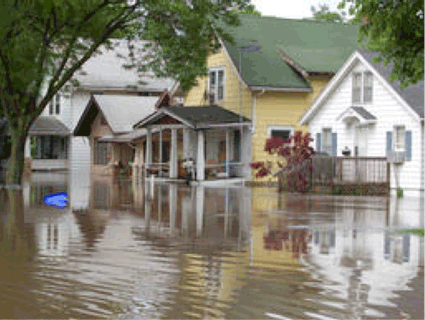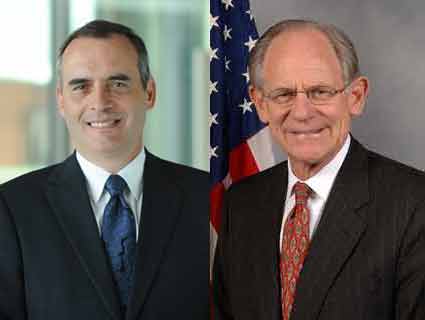If you’re a liberal or centrist, generally inclined to bash those “hippies” to the left of you—well, perhaps you should stop and think about it for a moment, and not resume bashing until you at least understand the best case activists can make for what they’re trying to achieve, and the particular strategy they’ve chosen.
That was one upshot of the latest Climate Desk Live briefing in Washington, DC, a collaboration between the Climate Desk and one of its key partners, Grist. The event focused on what the Keystone XL Pipeline protest movement means to the future of environmentalism, and featured a panel that spanned from activist to centrist, uniting representatives of the climate grassroots group 350.org and the Council on Foreign Relations. (Mega archive of event Tweets here.)
The protestors and organizers surrounding Keystone XL have often been criticized for picking the wrong fight by focusing on a pipeline that is unlikely to be defeated and, some claim, won’t significantly increase global carbon emissions. The activists argue back that the fight is important as a galvanizing battle, and that when it comes to wanton burning of fossil fuels, it’s simply time to take a stand.
Against this backdrop, the panel took up the question of what the impact this movement could have on the broader push for limiting carbon emissions. On that, everyone agreed that the notion that the Keystone XL protests will have any one clear effect, whether good or bad, is far too simplistic. The movement’s impact echo in complex ways—perhaps backfiring in some respects yet promoting progress in others. Caught up in the moment as we all are, we can’t fully say—but for that very reason, how sure are we that we can criticize?
May Boeve, who as a student activist worked with Bill McKibben and went on to co-found 350.org (and is now its executive director), spoke first, and frankly, about the anti-Keystone movement. “Is it the perfect political battle?” she asked. “Are we sure we’re gonna win? No.” But Boeve argued that the movement has mobilized a new constituency, and that itself is an achievement that will extend beyond this specific fight. “No matter what the president decides, we have a climate movement now that is stronger than we’ve ever had, and it is going to keep growing,” she said.
Boeve was followed by two journalists who have struggled with the Keystone issue and, ultimately, come out on the side of the activists. For Grist‘s David Roberts, the reason was simple: “Aside from whether Keystone XL is the right target, or how much effect on carbon emissions Keystone may or may not have, the fact that forty thousand people uprooted themselves and went to DC on a freezing cold day, and stood there chanting, is a signal.” For Roberts, it’s silly to say that we know precisely what will draw attention to the climate crisis. Rather, “we don’t know what’s going to make change, so just need to pull every lever that’s available.”
Indeed, Roberts suggested that by making climate dissent visible, and by showing that a lot of people care about our burning of fossil fuels, activists may make…a lot of people care. Sociologists talk about the concept of “social proof”: People shift their behavior to match what they see others doing, because that’s a cue that helps them to determine what is and isn’t accepted. This logic suggests people should see more protesters causing a ruckus over climate change.
Michael Grunwald, the bestselling author of The New New Deal: The Hidden Story of Change in the Obama Era, was in surprise agreement with Roberts on this. While Grunwald considered himself more of a centrist than other panelists, his view on Keystone and climate change was that sometimes, you just have to take a stand. “If we think it’s a war, sometimes you’ve got to show that you’re willing to fight,” he said. And if we are now met on a great battlefield called Keystone—well, so be it, said Grunwald. Criticizing activists at this point, he remarked—to much laughter—is like saying, “Hey Rosa Parks, it’s not about the bus system!”
The event also offered an appropriately cautionary note. Michael Levi of the Council on Foreign Relations, author of the new book The Power Surge: Energy, Opportunity, and the Battle for America’s Future, outlined possible negative side-effects from the Keystone protests. For instance: If President Obama blocks the pipeline, enraging Republicans and also a number of congressional Democrats, there’s a risk that Congress might “take away his Clean Air Act authority,” Levi suggested. “I think that’s a big deal.” Then there’s the broader political problem: A lot of people in “depressed communities that are struggling economically” look to energy development projects, like the pipeline, for jobs. Those people aren’t the enemy, and could be alienated if they see climate protestors as threatening local economic growth. “What I worry about is the hollowing out of the middle on climate change,” Levi said.
So what’s the ultimate answer? As the Keystone saga unfolds, nobody can really say what all of its ramifications will be. Meanwhile, the activists are busy and, just maybe, scaring the center a little. Pressure on moderate politicians, Roberts explained, “only works if there’s genuine fear of what the crazy hippies might do.” Like make history, for instance. Or as Roberts put it: “In conclusion: ‘Yay, activism!'”















